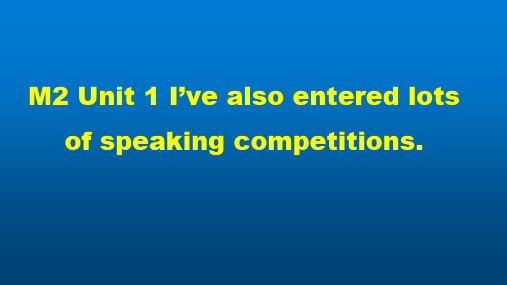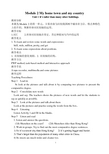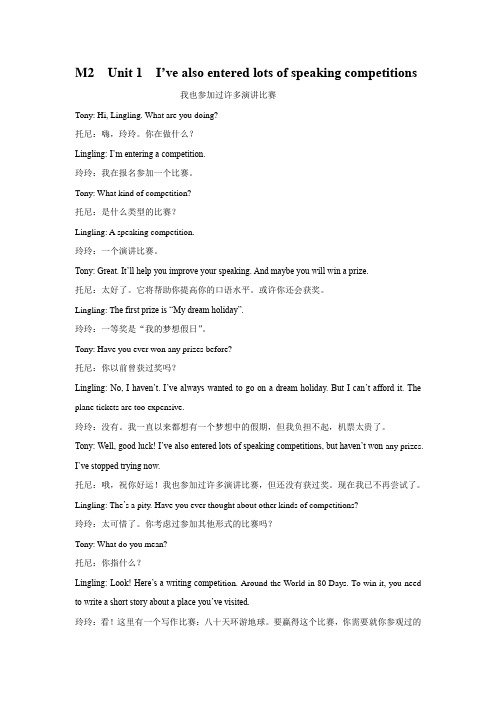2014新版外研版八年级下册M2 U1(预备)
八年级下册初二英语(外研版)M2Unit1 I've also entered lots ...

Summary
Lingling has visited / hasn’t ever visited the US. 谈论某人过去的经历 ever用以加强语气
“sb. have / has (not) ever + done”
e.g. I have seen the movie twice.
e.g. They haven’t ever been to China.
M2 Unit 1 I’ve also entered lots of speaking competitions.
travel experiences
[ɪk'spɪəriəns] n. 经历,阅历 • Where have you been?
• When and how did you go there? • What did you do there? • How did you feel?
Listen to the dialogue again and check what Lingling and Tony have or have not done.
Name
Experiences
Yes No
has won some prizes. Lingling
has always wanted to go on a dream holiday.
Yes No
has won some prizes.
√
Lingling has always wanted to go on a dream holiday.
√
— Has Lingling always wanted to go on a dream holiday? — Yes, she has.
外研版八年级英语下册M2Unit1

Module 2 My home town and my countryUnit 1 It’s taller than many other buildings.教材分析本课为Module 2的第一单元,主要内容为比较我国两个城市在方位、特点和特色上的不同,掌握形容词比较级的运用。
教学目标1.词汇2.形容词比较级在肯定、否定和疑问句当中的运用教学重点1. To learn and review some words and expressions:hiill, wide, million, pretty, and get2. To learn some expressions about positions.教学难点1. 比较级的变化规则。
2. 比较级的结构。
教学方法PWP method, task-based method and interactive approach教学手段A tape recorder, multimedia and some pictures教学过程Teaching Procedures:Step 1 Lead-inSs look at the pictures and talk about it by comparing two pictures to present the comparative degree.Step 2 Consolidate new wordsLook and say. The teachers shows the pictures of new words and let the students to say as quickly as possible.Step 3 Look at the pictures and talk about themLook at the pictures and practice using the words from the box..Step 4 ListeningListen Activity 1 and fill in the blanks.Step 5 Listen and read1. Listen and answer the questions.(1)Is Shenzhen on the coast? (2)Is Shenzhen older than Hong Kong?2. Work in groups. Try to find out the most comparative degree sentences.1) So it’s a newer city than Hong Kong?2) It’s getting bigger and busier.3) That’s larger than the population of many other cities in C hina.4) Its streets are much wider and cleaner too.5) It’s taller than many other buildings in Shenzhen.3. Complete the passage about Shenzhen.4. Everyday English.5. Point out the main points in the passage.Step 6 Complete the sentencesComplete the sentences with the correct form of the words from the box.You need to use some of the words more than once.Step 7 Listen and repeatListen and notice the underlined words.1)— Shenzhen is larger in population than Beijing. —No, it isn’t. It’s smaller.2) — Hong Kong is newer than Shenzhen. —No, it isn’t. It’s older.3) — Shenzhen is as old as Hong Kong. —No, it isn’t. It’s newer.4) — Hong Kong is as busy as Shenzhen. —No, it isn’t. It’s busier.Step 8 Now work in pairs. Listen again and repeat.1)— Shenzhen is larger in population than Beijing. —No, it isn’t. It’s smaller.2) — Hong Kong is newer than Shenzhen. —No, it isn’t. It’s older.3) — Shenzhen is as old as Hong Kong. —No, it isn’t. It’s newer.4) — Hong Kong is as busy as Shenzhen. —No, it isn’t. It’s busier.Step 9 Compare Hong Kong with your home town. Make notes in the table.Hong Kong Your home towna big cityStep 10 Work in pairs. Talk about the differences between Hong Kong and your home town. Use big, small, hot, cold, tall or new.— Is your home town bigger than Shenzhen? —No, it isn’t. It’s smaller than Shenzhen. Step 11 Learning to learn To learn about sentences stress.Step 12 Grammar比较级Step 13 Exercise 练习比较级的变化规则。
外研版八年级下册英语M2U1

e.g. The two girls stopped talking when they saw me. 那两个女孩一见到我就停止了讲话。
The two girls stopped to talk to me when they saw me. 那两个女孩一见到我就停下来和我讲 话。
6. That’s a pity. 很遗憾! pity表示“遗憾,可惜”。 That’s a pity. = It’s a pity.
holiday.
3. I’ve also entered lots of speaking competitions, but haven’t won any prizes.
4. I’ve stopped trying now. 5. Have you ever thought about other
Can you afford a new car? 你能买得起新的汽车吗? They can’t afford to send their
children to college. 他们没钱送他们的孩子去学校。
5. I’ve stopped trying now. 我已经不再尝试了。 stop doing sth. 表示“停止正在做的事 情” stop to do sth. 表示“停下正在做的事 去做另件事”
Are you interested in the speaking competition? Yes, I am. / No, I am not.
competition n. 比赛,竞赛
prize n. 奖品,奖项
first prize
pity n. 可惜,遗憾
ever 1 visit 2
exciting 4 tired 5 wonderful 3
M8 U2 (用)2014新版外研版英语八年级下册

Now answer to the questions in Activity 2.
2. Main contents:
•Key vocabulary square, kilometre, human, wake, wake sb. up, somebody, about, path, pull, freshwater •Key structures 1. We thought somebody was moving about. 2. Lingling’s uncle said it was an animal. …,and found it was just a hungry monkey looking for food.
a) Betty pulled a leaf off a plant. b) The noise woke everybody up. c) They climbed Mount Tianzi. d) A monkey made some noise. e) They camped by a small lake. f) Lingling’s uncle said that people should protect everything in Zhangjiajie.
Then we walked down the path, along a river, past trees and other plants and back to the camp. I pulled a leaf off a plant, but Lingling’s uncle said that it was wrong to pull leaves off plants and that we should protect everything here. I was very sorry.
(完整版)外研社英语八年级下M2U1课文I’vealsoenteredlotsofspeakingcompetitions.(中英文)

M2 Unit 1 I’ve also entered lots of speaking competitions我也参加过许多演讲比赛Tony: Hi, Lingling. What are you doing?托尼:嗨,玲玲。
你在做什么?Lingling: I’m entering a competition.玲玲:我在报名参加一个比赛。
Tony: What kind of competition?托尼:是什么类型的比赛?Lingling: A speaking competition.玲玲:一个演讲比赛。
Tony: Great. It’ll help you improve your speaking. And maybe you will win a prize.托尼:太好了。
它将帮助你提高你的口语水平。
或许你还会获奖。
Lingling: T he first prize is “My dream holiday”.玲玲:一等奖是“我的梦想假日”。
Tony: Have you ever won any prizes before?托尼:你以前曾获过奖吗?Lingling: No, I haven’t. I’ve always wanted to go on a dream holiday. But I can’t afford it. The plane tickets are too expensive.玲玲:没有。
我一直以来都想有一个梦想中的假期,但我负担不起,机票太贵了。
Tony: Well, good luck! I’ve also entered lots of speaking competitions, but haven’t won any prizes. I’ve stopped trying now.托尼:哦,祝你好运!我也参加过许多演讲比赛,但还没有获过奖。
现在我已不再尝试了。
2014版外研版新标准英语八年级(下)课文翻译

M6U1玲玲:嗨,大家好!进来找地方坐。
不好意思(家里)有点乱,我来把这些扇子放到架子/搁板上。
贝蒂:让我看看。
你有这么多扇子啊。
玲玲:是啊,大约有60把。
贝蒂:你从哪儿得来的?玲玲:大多数都是我收到的礼物。
大家知道我喜欢扇子,就经常送我扇子。
你收集东西吗?贝蒂:是的,我收集硬币和纸币,比如英镑和美元。
玲玲:硬币?那一定很有价值。
我能看看吗?贝蒂:当然!我把我的邮票也拿给你看看。
我收集世界各地的邮票。
我已经有六七本集邮册了。
托尼:我的爱好不像你们的爱好那么费钱——我收集票,汽车票和火车票。
贝蒂:但是旧车票什么用都没有!托尼:我知道。
但是当我看到这些车票的时候,我就会记起一些美好的地方。
玲玲:对,它们的价值并不是那么重要。
人们收藏东西也是为了纪念生活中重要的事情。
M6U2戴维的爱好很多学生都有爱好,比如阅读、绘画、种蔬菜或照顾动物。
有些爱好是休闲性的,有些是创造性的。
爱好可以促使你成长,培养你的兴趣,帮助你学习新的技能。
戴维•史密斯是一名学生,他的爱好之一是写作。
在2010年的夏天,他参加了一个为期4周的夏令营。
除了像帆船运动和爬山这些常见的活动以外,夏令营还有一门写作课程。
“老师是一位作家,她让我们谈论我们谈论自己的生活、讲有趣的故事,然后鼓励我们把夏令营的经历写下来。
”回到学校后,戴维以一名16岁男孩的生活为题材写了一个故事,并于2012年成书出版。
很多青少年都喜欢读他的书,戴维也因此成为一名成功的少年作家。
戴维是幸运的,因为他的爱好给他带来了快乐和成功。
但写作不是他唯一的爱好,他对许多其他的东西也很感兴趣。
“我也喜欢打排球,”戴维说,“我有一部分业余时间就用来在校队打排球。
也许我会在将来的书里写写我们排球队的事情。
”M7U1(玲玲正在为她的洛杉矶之旅作准备)玲玲:嗨,贝蒂。
我正在列一张旅行所需的清单。
我喜欢早一点把东西准备好。
你能帮我吗?贝蒂:当然!怎么帮?玲玲:嗯,我知道这样听起来很荒唐,但是我真不知道该带些什么。
初中英语外研版八年级下册M2U1预习指导(知识点+练习题)
八年级英语下册M2U1预习指导一、知识点1.experience ( 可数名词) 经历Eg: Please tell me about your experiences in Africa. 请给我讲讲你在非洲的经历。
experience (不可数名词) 经验Eg: Miss Li has 30 years’ teaching experience.李老师有30年的教学经验。
petition (名词) 比赛;竞赛-- compete (动词) “比赛”-- competitor (名词) “竞争者”Eg: speaking competition演讲比赛3.enter a competition 参加比赛enter = take part in 参加;进入Eg: I want to enter this competition.我想参加这个比赛。
4.what kind of …什么种类kind (名词) 种类常见搭配:all kinds of 各种各样的;a kind of 一种;different kinds of 不同种类的;kind of 有点(后加形容词);kind (形容词) 善良的Eg: There are all kinds of books in this library.在这个图书馆中有各种各样的书。
The panda is kind of cute.这只熊猫有点可爱。
He is a kind boy.他是一个善良的男孩。
5.help sb.with sth.= help sb.(to) do sth. 帮助某人做某事Help (名词)“帮助”With the help of... 在...的帮助下Eg: He helps me with English.= He helps me (to) learn English.他帮我学英语。
With the help of my teacher, my English improves.在老师的帮助下,我的英语提高了。
2014春期新版外研版英语八年级下册M3 U1(预备)
spaceship
news n.新闻;消息
scientists
Have scientists sent a spaceship to the moon yet? Yes, they have. They have already sent some spaceships to the moon.
solar system
Pluto
Mercury Venus planets Saturn the Sun the Earth Mars
Uranus
Neptune
Jupiter
Learning aims:
1. 当表示动作已经完成并对现在有一定的 影响时,我们用现在完成时。 2. 谓语动词: have/ has + P.P. 3. 标志词: already, just 或 yet. (位置) 4. 初步认识太空知识(科学)。 5. 学习本课的单词和短语。
写出下列动词的过去式、过去分词
No, I haven’t. I haven’t watered flowers yet .
water watered watered water flowers
Work in pairs
A: Have you …yet? B: Yes , I have. I have just / already … No , I haven’t. I haven’t….yet.
3. Have you cleaned your classroom yet(还,已经)? Yes, I have. I have already (已经)cleaned our classroom. No, I haven’t. I haven’t cleaned our classroom yet.
2014新课本外研版英语八年级下册module2experiences Unit 1
— Has Tony won any prizes?
— No, he hasn’t.
— Has Tony travelled much?
— No, he hasn’t.
• … good luck!
Hale Waihona Puke • That’s a pity. • That sounds wonderful …
1. I am entering a competition. 我正参加一个比赛。 enter表示“参加,报名”。还表示“进 入”。 e.g. Several of the world’s finest runners have entered the race. 几名世界最优秀 的运动员已报名参加比赛。 The thieves entered the building by the back door. 小偷从后门进入大楼。
6. That’s a pity. 很遗憾! pity表示“遗憾,可惜”。 That’s a pity. = It’s a pity. =You What a make pity! it up. 你可以编(一 7. can 个故事)。 make up 表示“编造;组成”。 e.g. The whole story is made up. 整个故事是虚构出来的。
请写出下面动词的过去分词。
1. visit -- _______ 2. ask -- ______ visited asked 3. travel -- _______ travelled 4. enter -- _______ entered 5. help -- _______ 6. win -- _____ helped won 7. want -- _______ 8. stop -- _______ wanted stopped 9. think -- _______ hoped thought 10. hope -- ______ 11. invite -- _______ invited 12. call -- _______ called
2014新版外研版八年级下册M2_U1(语法知识预备)
动词过去分词done的变化规则 2. 不规则动词的过去分词形式需要特殊记忆。 如: am/is --- was/ were --- been drink--- drank--- drunk 详见课本P126---P129
不规则动词表
Infinitive(原形) Past Tense(过去式) Past Participle(过去分词)
Yes, I have.
No, I haven’t.
I have ever eaten KFC food. 我曾经吃过肯德基食品。 Have you ever eaten KFC food? 你曾经吃过肯德基食品吗?
Yes, I have.
No, I haven’t.
现在完成时态 ( present perfect tense)
keep
lead
kept
led
kept
led
leave
learn
left
left
learned / learnt
learned / learnt
(二)ABB型:
lose
mean
lost
meant
lost
meant
meet
pay
met
paid
met
paid
read
say
read
said
read
said
visit your grandpa ----- have visited
him
Father: Tell your sister to buy some milk, John.
John: Oh, she has just(刚刚) bought some.
- 1、下载文档前请自行甄别文档内容的完整性,平台不提供额外的编辑、内容补充、找答案等附加服务。
- 2、"仅部分预览"的文档,不可在线预览部分如存在完整性等问题,可反馈申请退款(可完整预览的文档不适用该条件!)。
- 3、如文档侵犯您的权益,请联系客服反馈,我们会尽快为您处理(人工客服工作时间:9:00-18:30)。
动词过去分词done的变化规则 2. 不规则动词的过去分词形式需要特殊记忆。 如: am/is --- was/ were --- been drink--- drank--- drunk 详见课本P126---P129
不规则动词表
Infinitive(原形) Past Tense(过去式) Past Participle(过去分词)
不同的时间要使用不同的动词时态
past
present(now)
future
visit
I am visiting the Great Wall now. I will visit the Great Wall tomorrow. I visited the Great Wall yesterday.
I have ever visited the Great Wall.
enter
a competition
参加竞赛
Talk about experiences competition 比赛 a speaking competition 一次演讲比赛
I have ever entered a speaking competition. 我曾经参加过演讲比赛。 Have you ever entered a speaking competition? 你曾经参加过演讲比赛吗? Yes, I have. No, I haven’t.
came
beaten become
come
become
come
run
(五)AAA型:
ran
cost
run
cost
cost
(五)AAA型:
cut
cut
cut
hit
hurt
hit
hurt
hit
hurt
let
put
let
put
let
put
read
set
read
set
read
set
shut
shut
shut
B: Yes, I have. I have visited Beijing. No, I haven’t. I haven’t visited Beijing. A: Has she/he visited/played/… C: Yes, she/he has. She/He has visited/… No, she/he hasn’t. She /He hasn’t visited…
stolen
(一)ABC 型:
swim swam
take took
swum
taken thrown woken worn written
throw threw wake woke wear wore write wrote
(二) ABB型:
bring brought brought
build
buy
Yes, I have.
No, I haven’t.
Beihai Silver Beach
I have ever travelled to Beihai Silver Beach. 我曾经去过北海银滩旅游。 Have you ever travelled to Beihai Silver 你曾经去过北海银滩旅游吗? Yes, I have. No, I haven’t.
(一)ABC 型:
be(am,is,are) was / were
been
begin
bite break choose do
began
bit broke chose did
begun
bitten / bit broken chosen done
(一)ABC 型:
draw drew drawn
drink
the Great Wall
I haven’t visited the Great Wall. (否定句) 我没有去过长城旅游。 Have you ever visited the Great Wall? 你曾经去过长城旅游吗? Yes, I have. No, I haven’t.
I have ever been to Guangzhou. 我曾经去过广州。 Have you ever been to Guangzhou? 你曾经去过广州吗?
练习1: 写出下列动词的过去分词:
put--make---
hear--hurry---
come--watch---
swim--want---
be--study---
talk--stop---
take---
see---
like---
Mother: John, clean your teeth please. John: Mum, I have cleaned them.
drive
drank
drove
drunk
driven
eat
fall
ate
fell
eaten
fallen
fly
forget
flew
forgot
flown
forgotten
get
got
gotten / got
(一)ABC 型:
give gave given
go
grow
went
grew
gone
grown
现在完成时(P103)
用法:1.表示以前某个时间已经发生的行为或 曾经做过的事情对现在有某种影响。
I have already seen the film.我已经看过这部电影了。 I have ever travelled to Nanning Science Museum. I have just had lunch. 我刚刚吃过午餐。
Yes, I have.
No, I haven’t.
I have ever eaten KFC ood. 我曾经吃过肯德基食品。 Have you ever eaten KFC food? 你曾经吃过肯德基食品吗?
Yes, I have.
No, I haven’t.
现在完成时态 ( present perfect tense)
play football
I have ever played football. 我曾经踢过足球。 Have you ever played football? 你曾经踢过足球吗? Yes, I have. No, I haven’t.
I have ever played basketball. 我曾经打过蓝球。 Have you ever played basketball? 你曾经打过蓝球吗?
sell
send
sold
sent
sold
sent
(二)ABB型: sit sleep smell sat slept sat slept
smelt/smelled smelt/smelled
spell
spend
spelt/spelled
spent
spelt/spelled
spent
(二)ABB型:
do --- did --- done
过去分词的构成分为 规则变化和不规则变化两种:
规则变化:
a) 一般情况下,在动词后直接加ed, 如
play---played, water---watered, work---worked, finish---finished等; visit--- visited
stand
stood
stood
sweep
teach tell think
swept
taught told thought
swept
taught told thought
understand win won
understood understood won
(三)AAB型:
beat
(四)ABA型:
beat became
visit your grandpa ----- have visited
him
Father: Tell your sister to buy some milk, John.
John: Oh, she has just(刚刚) bought some.
Father: Tell your sister to buy some milk, John.
2.表示到目前为止已经完成的事情。
My uncle has travelled around the world.我叔叔已经周游了世界。
构成方式 (have/has+done)
肯定形式:主语(sb.) +has / have + v.过去分词(done) . 否定形式:主语(sb.) +has / have + not + v.过去分词(done) 疑问形式: Has / have +主语+ v.过去分词(done)?
1. I have ________ (watch) the football match. 2. Have you ever _________(play) the piano? 3. --- Have you ________(finish) your homework? --- Yes, I have. 4. --- Has she ever _________(travel) around the world? --- No, she hasn’t. 5. My father has ever _______(visit) the Great Wall. 6. The English teacher has ________(work) here for 12 years. 7. We have ________ (study) English for one and a half years. 8. They have just _______ (shop) many things on the Internet.
